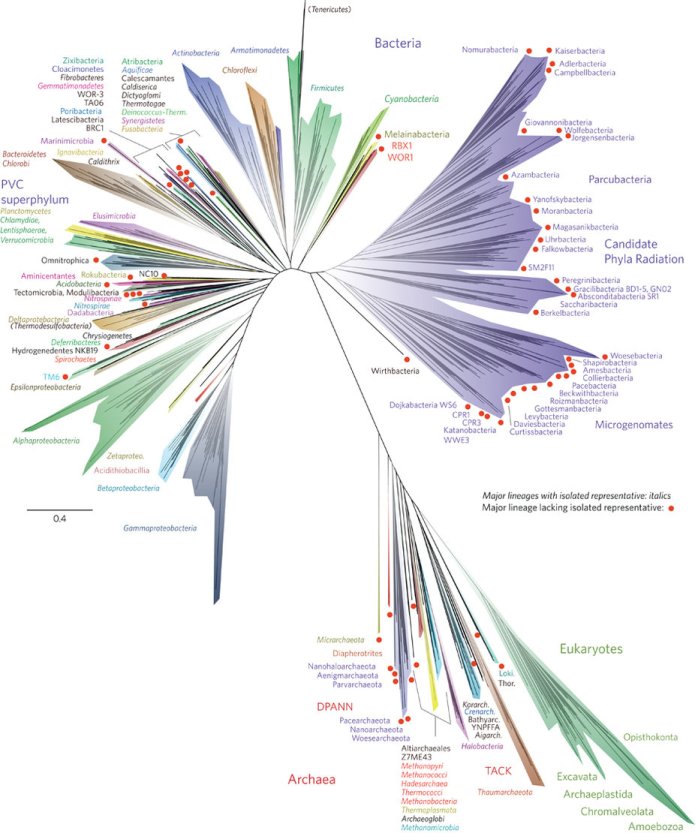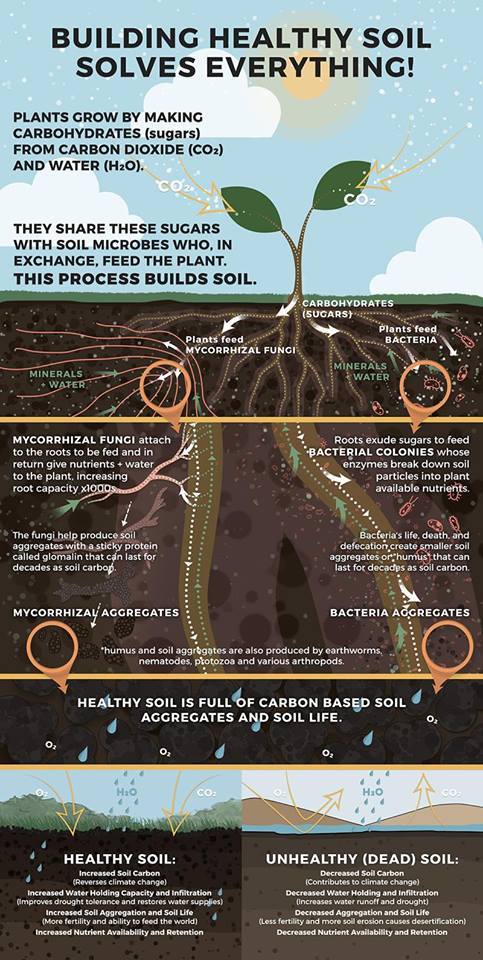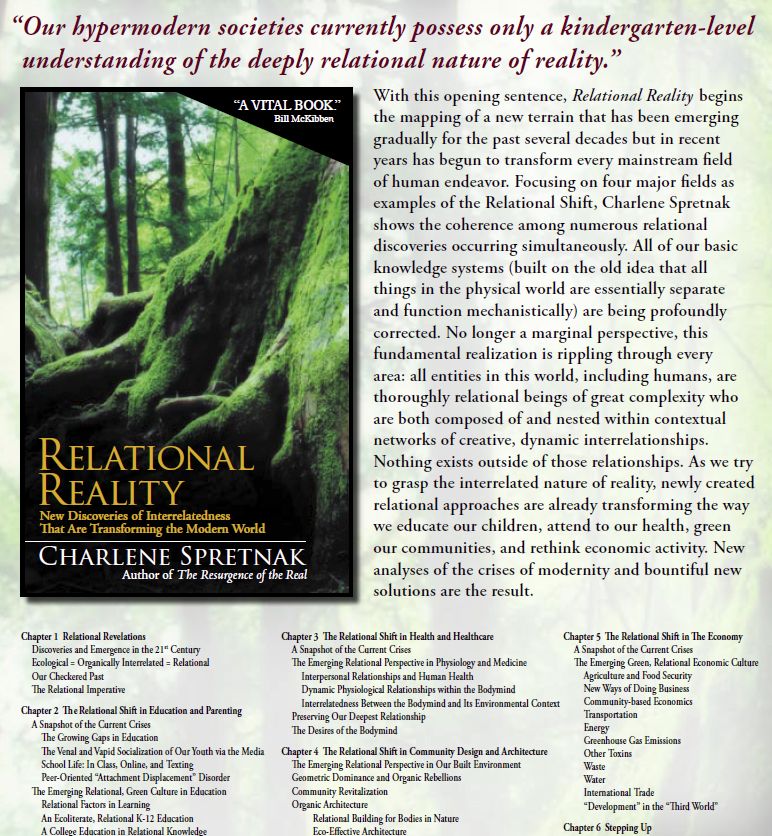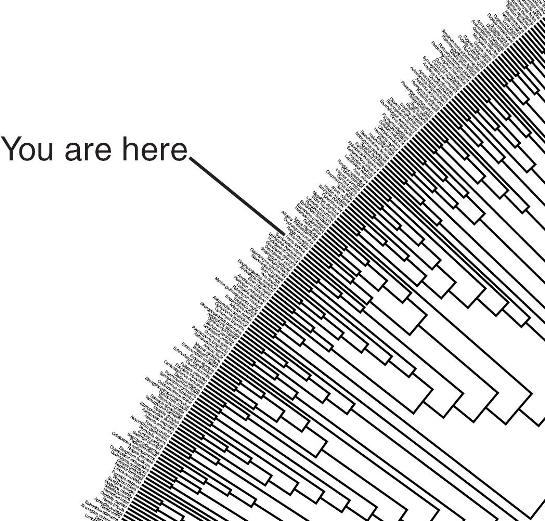Microbiomes at Risk: Difference between revisions
Siterunner (talk | contribs) No edit summary |
Siterunner (talk | contribs) No edit summary |
||
| (35 intermediate revisions by the same user not shown) | |||
| Line 8: | Line 8: | ||
''Microorganisms, the basis of [https://www.greenpolicy360.net/w/Regenerative_Agriculture Soil health]...'' | |||
''Microorganisms, the basis of [https://www.greenpolicy360.net/w/TinyBlueGreen the Ocean's food chain]...'' | |||
''Microorganisms, a principal source of [https://www.greenpolicy360.net/w/Category:Atmospheric_Science Earth's atmospheric oxygen]...'' | |||
''Microorganisms, tiny, unseen unappreciated, but with profound, vital impact...'' | |||
<big>''Microbiomes empowering life, living systems, all related life, full of untapped secrets''</big> | |||
:[[File:Soil is the root stuff.jpg]] | |||
<big>[[Regenerative Agriculture]]</big> | |||
<big>[[Permaculture Green Practices]]</big> | |||
························································ | |||
<big>'''Connections & Communities'''</big> | <big><big><big>'''''Connections & Communities'''''</big></big></big> | ||
* [https://www.greenpolicy360.net/w/File:Relational_Reality_by_Charlene_Spretnak.png ''"Relational Reality"] | * [https://www.greenpolicy360.net/w/File:Relational_Reality_by_Charlene_Spretnak.png ''"Relational Reality"] | ||
| Line 32: | Line 39: | ||
* [https://www.greenpolicy360.net/w/It%27s_All_Related ''Systems Thinking, "It's All Related"''] | * [https://www.greenpolicy360.net/w/It%27s_All_Related ''Systems Thinking, "It's All Related"''] | ||
<big><big><big>'''''[[It's All Related]]'''''</big></big></big> | |||
| Line 41: | Line 51: | ||
<big>'''Microbiomes and Climate Change'''</big> | <big><big>'''Health & Microbiomes'''</big></big> | ||
* [https://www.theguardian.com/news/2018/mar/26/the-human-microbiome-why-our-microbes-could-be-key-to-our-health ''The Human Microbiome: Why our microbes could be key to our health''] | |||
* [https://hmpdacc.org/ ''Human Microbiome Project''] | |||
* [https://www.nytimes.com/1993/04/16/us/animals-and-fungi-evolutionary-tie.html ''Animals and Fungi: Evolutionary Tie?''] | |||
························································ | |||
<big><big>'''Microbiomes and Climate Change'''</big></big> | |||
https://en.wikipedia.org/wiki/Microorganism | https://en.wikipedia.org/wiki/Microorganism | ||
Trillions of (micro) species -- https://cosmosmagazine.com/life-sciences/earth-home-trillion-species | Trillions of (micro) species -- https://cosmosmagazine.com/life-sciences/earth-home-trillion-species | ||
'''A Microbial 'new' Tree of Life''' -- http://www.nytimes.com/2016/04/12/science/scientists-unveil-new-tree-of-life.html | '''A Microbial 'new' Tree of Life''' -- http://www.nytimes.com/2016/04/12/science/scientists-unveil-new-tree-of-life.html | ||
: | :A microcosmic world not being seen, heard, or taken into consideration -- although they are there, supporting larger, macro-systems of life | ||
························································ | |||
[http://voices.nationalgeographic.com/2016/11/17/fate-of-small-species-has-huge-implications-for-our-ocean/ '''The Fate of Small Species and the Oceans'''] | |||
[http://voices.nationalgeographic.com/2016/11/17/fate-of-small-species-has-huge-implications-for-our-ocean/ <big>'''The Fate of Small Species and the Oceans'''</big>] | |||
| Line 61: | Line 86: | ||
Microbes/Diatoms/Blue-Green Ocean Life at Risk | Microbes/Diatoms/Blue-Green Ocean Life at Risk | ||
: | '''"A single kind of blue-green algae in the ocean (Prochlorococcus) produces the oxygen in [https://www.youtube.com/watch?v=-ty5puoADMU one of every five breaths we take"]''' | ||
[http://www.greenpolicy360.net/w/File:Chlorophyll_in_the_oceans_and_vegetation_on_land_world_map_2003_NASA-Goddard.jpg '''Chlorophyll in the Oceans / Life at Sea / NASA ocean science mapping'''] | |||
<big>'''[[TinyBlueGreen]]'''</big> | |||
''@GreenPolicy360'' | |||
[http://www.tinybluegreen.com '''''www.tinybluegreen.com'''''] | : [http://www.tinybluegreen.com '''''www.tinybluegreen.com'''''] | ||
: [http://blueplanetsociety.blogspot.co.uk/2016/02/whats-happening-to-oceans-phytoplankton.html '''''Global Warming: What’s happening to the oceans’ phytoplankton, sources of oxygen, foundation of the marine food chain?'''''] | |||
<big><font color=green>○ ○ ○ ○ ○ ○ ○ ○ ○ ○ ○</font></big> | |||
<big>'''Earth, supporting a trillion+ species? How Many species?'''</big> | |||
* http://www.archaeologynewsnetwork.blogspot.com/2016/05/earth-may-be-home-to-one-trillion.html | |||
:"Earth could contain nearly 1 trillion+ species, with only one-thousandth of 1 percent now identified" | |||
:Study results suggest that actually identifying every microbial species on Earth is an almost unimaginably huge challenge. To put the task in perspective, the [http://www.earthmicrobiome.org/ Earth Microbiome Project] -- a global multidisciplinary project to identify microscope organisms -- has so far cataloged less than 10 million species. | :Study results suggest that actually identifying every microbial species on Earth is an almost unimaginably huge challenge. To put the task in perspective, the [http://www.earthmicrobiome.org/ Earth Microbiome Project] -- a global multidisciplinary project to identify microscope organisms -- has so far cataloged less than 10 million species. | ||
"Of those cataloged species, only about 10,000 have ever been grown in a lab, and fewer than 100,000 have classified sequences... this leaves 100,000 times more microorganisms awaiting discovery -- and 100 million to be fully explored. Microbial biodiversity, it appears, is greater than ever imagined." | :"Of those cataloged species, only about 10,000 have ever been grown in a lab, and fewer than 100,000 have classified sequences... this leaves 100,000 times more microorganisms awaiting discovery -- and 100 million to be fully explored. Microbial biodiversity, it appears, is greater than ever imagined." | ||
| Line 88: | Line 120: | ||
http://e360.yale.edu/slideshow/is_climate_change_putting_br_-_worlds_microbiomes_at_risk/520/2/ | '''Researchers are only beginning to understand the complexities of the microbes in the earth’s soil and oceans and the role they play in fostering healthy ecosystems.''' | ||
* http://e360.yale.edu/slideshow/is_climate_change_putting_br_-_worlds_microbiomes_at_risk/520/2/ | |||
Climate change is threatening to disrupt these microbes and the key functions they provide... | Climate change is threatening to disrupt these microbes and the key functions they provide... | ||
| Line 98: | Line 132: | ||
Researchers say that as the planet warms, essential diversity and function in the microbial world could be lost... | Researchers say that as the planet warms, essential diversity and function in the microbial world could be lost... | ||
'''http://www.greenpolicy360.net/w/Extinction''' | |||
* '''http://www.greenpolicy360.net/w/Extinction''' | |||
Whether microbes can go extinct is not settled science. When it comes to microbes, “everything is everywhere” has been the adage among researchers who thought that all types lived everywhere, though abundance varied. Yet as more is learned about these tiniest of critters, some scientists believe that likely isn't true, and there is concern that some key microbes could be rendered extinct before we know what they do. | Whether microbes can go extinct is not settled science. When it comes to microbes, “everything is everywhere” has been the adage among researchers who thought that all types lived everywhere, though abundance varied. Yet as more is learned about these tiniest of critters, some scientists believe that likely isn't true, and there is concern that some key microbes could be rendered extinct before we know what they do. | ||
<big><font color=green>○ ○ ○ ○ ○ ○ ○ ○ ○ ○ ○</font></big> | <big><font color=green>○ ○ ○ ○ ○ ○ ○ ○ ○ ○ ○ ○ ○ ○ ○</font></big> | ||
| Line 109: | Line 145: | ||
<big><font color=green>○ ○ ○ ○ ○ ○ ○ ○ ○ ○ ○</font></big> | <big><font color=green>○ ○ ○ ○ ○ ○ ○ ○ ○ ○ ○ ○ ○ ○ ○</font></big> | ||
| Line 132: | Line 168: | ||
'''Microbiology: Create a global microbiome effort''' | '''Microbiology: Create a global microbiome effort''' | ||
http://www.nature.com/news/microbiology-create-a-global-microbiome-effort-1.18636 | * http://www.nature.com/news/microbiology-create-a-global-microbiome-effort-1.18636 | ||
[https://www.atlasobscura.com/articles/do-plants-have-microbiomes ''There Is a Whole World Inside Every Plant''] | |||
| Line 159: | Line 198: | ||
[[Category:Atmospheric Science]] | [[Category:Atmospheric Science]] | ||
[[Category:Agriculture]] | [[Category:Agriculture]] | ||
[[Category:Alternative Agriculture]] | |||
[[Category:Biodiversity]] | [[Category:Biodiversity]] | ||
[[Category:Biogeosciences]] | [[Category:Biogeosciences]] | ||
| Line 172: | Line 212: | ||
[[Category:Ocean Science]] | [[Category:Ocean Science]] | ||
[[Category:Oceans]] | [[Category:Oceans]] | ||
[[Category:Origins of Life]] | |||
[[Category:Rainforest]] | [[Category:Rainforest]] | ||
[[Category:Resilience]] | |||
[[Category:Soil]] | [[Category:Soil]] | ||
[[Category:Sustainability]] | [[Category:Sustainability]] | ||
[[Category:Sustainability Policies]] | |||
[[Category:Wildlife]] | [[Category:Wildlife]] | ||
Revision as of 17:55, 24 June 2020
An Unseen World
The 'Tiny Little Ones'
Microorganisms, the basis of Soil health...
Microorganisms, the basis of the Ocean's food chain...
Microorganisms, a principal source of Earth's atmospheric oxygen...
Microorganisms, tiny, unseen unappreciated, but with profound, vital impact...
Microbiomes empowering life, living systems, all related life, full of untapped secrets
························································
Connections & Communities
························································
Health & Microbiomes
························································
Microbiomes and Climate Change
https://en.wikipedia.org/wiki/Microorganism
Trillions of (micro) species -- https://cosmosmagazine.com/life-sciences/earth-home-trillion-species
A Microbial 'new' Tree of Life -- http://www.nytimes.com/2016/04/12/science/scientists-unveil-new-tree-of-life.html
- A microcosmic world not being seen, heard, or taken into consideration -- although they are there, supporting larger, macro-systems of life
························································
The Fate of Small Species and the Oceans
Microbes on land and at sea, everywhere, wherever you are, there they are -- http://www.greenpolicy360.net/w/Category:Soil
Microbes/Diatoms/Blue-Green Ocean Life at Risk
"A single kind of blue-green algae in the ocean (Prochlorococcus) produces the oxygen in one of every five breaths we take"
Chlorophyll in the Oceans / Life at Sea / NASA ocean science mapping
@GreenPolicy360
○ ○ ○ ○ ○ ○ ○ ○ ○ ○ ○
Earth, supporting a trillion+ species? How Many species?
- "Earth could contain nearly 1 trillion+ species, with only one-thousandth of 1 percent now identified"
- Study results suggest that actually identifying every microbial species on Earth is an almost unimaginably huge challenge. To put the task in perspective, the Earth Microbiome Project -- a global multidisciplinary project to identify microscope organisms -- has so far cataloged less than 10 million species.
- "Of those cataloged species, only about 10,000 have ever been grown in a lab, and fewer than 100,000 have classified sequences... this leaves 100,000 times more microorganisms awaiting discovery -- and 100 million to be fully explored. Microbial biodiversity, it appears, is greater than ever imagined."
○ ○ ○ ○ ○ ○ ○ ○ ○ ○ ○
Researchers are only beginning to understand the complexities of the microbes in the earth’s soil and oceans and the role they play in fostering healthy ecosystems.
Climate change is threatening to disrupt these microbes and the key functions they provide...
One fact now being studied: the Earth's soil (and ocean) has locked up a great deal of carbon and should it come unlocked as C02 it could dramatically speed up climate change. "A big question is whether soil will be a sink or source of greenhouse gases in the future..."
Researchers say that as the planet warms, essential diversity and function in the microbial world could be lost...
Whether microbes can go extinct is not settled science. When it comes to microbes, “everything is everywhere” has been the adage among researchers who thought that all types lived everywhere, though abundance varied. Yet as more is learned about these tiniest of critters, some scientists believe that likely isn't true, and there is concern that some key microbes could be rendered extinct before we know what they do.
○ ○ ○ ○ ○ ○ ○ ○ ○ ○ ○ ○ ○ ○ ○
Soil Loss and Sustainable Ag: Serious Questions
○ ○ ○ ○ ○ ○ ○ ○ ○ ○ ○ ○ ○ ○ ○
What About the Earth's Microbiome?
http://blogs.scientificamerican.com/guest-blog/what-about-earth-8217-s-microbiome/
○ ○ ○ ○ ○ ○ ○ ○ ○ ○ ○
See Unified Microbiome Initiative
https://www.whitehouse.gov/blog/2016/01/27/calling-all-microbiome-science-champions
Scientists and engineers are teaming up to answer fundamental questions about the microbiome – the billions of microorganisms that live on and in us, our homes, our food, and our planet. Questions such as, “What is a healthy microbiome?” and “How can we manage microbiomes to keep them resilient?” are applicable to microbiomes in habitats as diverse as oceans, soil, and the human body...
○ ○ ○ ○ ○ ○ ○ ○ ○ ○ ○
Microbiology: Create a global microbiome effort
There Is a Whole World Inside Every Plant
○ ○ ○ ○ ○ ○ ○ ○ ○ ○ ○
Microbiomes at the Roots: A New Look at Forest Ecology
-- Green Policy / Global & Local
-- #Earth360 #EarthPOV #EarthObservations #EarthScience
-- #PlanetCitizens #PlanetEarth #EcologyStudies #EnvironmentalSecurity #Sustainability
and... in passing, a Hollywood creative thanks to Dr. Seuss for reminding us of the Who!
.



